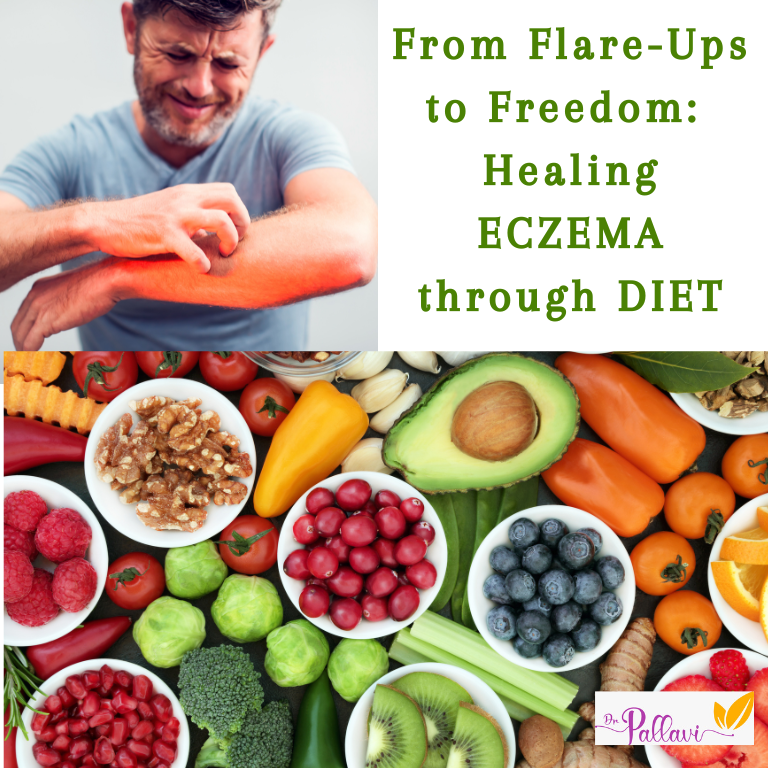
“From Flare-Ups to Freedom: Healing Eczema through Diet”
Eczema is a chronic skin condition characterized by dry, itchy, and inflamed skin. While there is no specific diet that can cure eczema, certain foods may trigger or worsen symptoms in some people. Therefore, following an eczema-friendly diet that can reduce inflammation and improve overall skin health may be valuable.

Eczema, also known as Atopic dermatitis, is a chronic skin condition characterized by red, dry, itchy, and inflamed skin. It often appears as patches on different parts of the body, such as the face, hands, elbows, and knees. Eczema can be caused by a combination of genetic and environmental factors, and it tends to run in families.
Various factors, such as stress, irritants, allergens, and climate changes, can trigger the condition.
While eczema has no cure, it can be managed through various holistic treatments. Managing eczema holistically means addressing the condition through an integrated approach, including dietary changes, stress management, and skin care. It’s essential to take a comprehensive approach to manage eczema to address the multiple factors contributing to the condition.
For eczema, lifestyle modifications can play an critical role in managing the condition.
Here are some lifestyle changes that can help:
- Avoid triggers: Identify and avoid triggers that can worsen your eczema symptoms, such as certain fabrics, soaps, detergents, or foods.
- Moisturize: Keeping the skin moisturized is important for people with eczema. Use fragrance-free, non-irritating moisturizers regularly to help keep your skin hydrated.
- Use gentle products: Use mild, fragrance-free, and non-irritating products for your skin, such as cleansers, moisturizers, and makeup.
- Manage stress: Stress can trigger or worsen eczema symptoms, so it’s essential to manage stress through techniques such as mindfulness, deep breathing, or meditation.
- Maintain a healthy diet: A healthy diet rich in fruits, vegetables, whole grains, lean protein, and healthy fats can help reduce inflammation and improve overall health.
- Avoid scratching: Scratching can further irritate and worsen eczema symptoms, so it’s essential to avoid scratching and keep your nails short.
- Stay hydrated: Drinking plenty of water can help keep your skin hydrated and improve overall health.
When combined with medical treatments, these lifestyle modifications can help manage eczema symptoms and improve quality of life.
Why does DIET play an important role?
The mechanism behind the relationship between diet and eczema is not yet fully understood, but researches suggests that certain foods may trigger an immune response that leads to inflammation and worsens eczema symptoms.
For example, some people with eczema may have a food allergy or sensitivity that triggers an immune response, leading to inflammation and skin irritation. In addition, certain foods, such as dairy and gluten, can increase intestinal permeability, allowing inflammatory substances to leak into the bloodstream and trigger an immune response.
Furthermore, some foods may impact the gut microbiome, which plays a role in immune system function and inflammation. A healthy gut microbiome can help reduce inflammation in the body, while an imbalanced microbiome can lead to increased inflammation.
Overall, while the exact mechanism is not yet fully understood, it is clear that diet can significantly impact eczema symptoms, and making dietary modifications can be an important part of eczema management.
What do RESEARCHES say?
There has been a significant amount of research into the relationship between diet and eczema. While the exact mechanism is not yet fully understood, research suggests that dietary modifications can help improve eczema symptoms.
For example, a study published in the Journal of the American Academy of Dermatology found that a low-inflammatory diet, which emphasizes fruits, vegetables, whole grains, lean protein, and healthy fats, can improve eczema symptoms in adults. Another study published in the British Journal of Dermatology found that children with eczema who followed a diet rich in fruits and vegetables had a reduced risk of severe eczema symptoms.
In addition, research has found that eliminating certain foods, such as dairy or gluten, from the diet can help improve eczema symptoms in some people with food allergies or sensitivities.
Overall, while more research is needed to fully understand the relationship between diet and eczema, the current evidence suggests that making dietary modifications can be an important part of eczema management. It’s always a good idea to consult with a healthcare professional or registered dietitian before making any significant dietary changes.

Here are some dietary guidelines that may help alleviate eczema symptoms:
- Avoid common allergens: As mentioned, certain foods can trigger an allergic reaction in some people and worsen eczema symptoms. It’s important to identify which foods may be causing your symptoms and avoid them. Common allergens include milk, eggs, soy, wheat, peanuts, and tree nuts. Elimination diets, where suspected trigger foods are removed from the diet for a period, can be useful in identifying potential triggers. Alternatively, a healthcare provider or a registered dietitian may perform tests to identify specific food sensitivities or allergies.
- Include anti-inflammatory foods: Foods rich in omega-3 fatty acids, such as fatty fish (salmon, tuna, mackerel), flaxseeds, and chia seeds, can help reduce inflammation in the body and improve eczema symptoms. Additionally, fruits and vegetables that are high in antioxidants, such as berries, leafy greens, and citrus fruits, may also help reduce inflammation. Aim to include a variety of these foods in your diet.
- Eat probiotics: Probiotics are beneficial bacteria that live in the gut and can help improve digestion and boost the immune system. Consuming probiotic-rich foods such as yogurt, kefir, sauerkraut, and kimchi may help improve eczema symptoms. Additionally, prebiotic foods, which feed the beneficial gut bacteria, such as onions, garlic, bananas, and asparagus, may also be beneficial.
- Stay hydrated: Drinking plenty of water can help keep the skin hydrated and prevent dryness and itching. Aim to drink at least 8 cups of water per day, and avoid sugary or caffeinated beverages that can dehydrate the skin.
- Avoid processed foods: Processed foods, such as fast food, junk food, and packaged snacks, are often high in sugar, salt, and unhealthy fats, which can worsen inflammation and eczema symptoms. Instead, opt for whole, nutrient-dense foods that promote skin health. These foods may include fresh fruits and vegetables, lean proteins, whole grains, and healthy fats.
- Consider an elimination diet: An elimination diet involves removing certain foods from your diet for a period and then gradually reintroducing them to identify potential triggers. This can be a useful tool in identifying food sensitivities or allergies that may be contributing to your eczema symptoms. However, it’s important to work with a healthcare provider or a registered dietitian to ensure that your diet is still balanced and nutritious.
- Be mindful of food additives: Certain food additives, such as preservatives, flavorings, and artificial colors, can trigger eczema symptoms in some people. These additives are often found in processed foods, so it’s important to read labels carefully and opt for whole, minimally processed foods whenever possible.
- Consider supplementing with vitamin D: Some research suggests that low levels of vitamin D may be associated with an increased risk of eczema. If you’re not getting enough vitamin D through your diet or sun exposure, you may want to consider taking a vitamin D supplement. However, it’s important to talk to your healthcare provider before starting any new supplement regimen.
It’s important to note that everyone’s eczema triggers are different, and what works for one person may not work for another. If you have severe eczema symptoms, consult a healthcare provider or a registered dietitian for personalized dietary advice. They can help you identify your specific triggers and design a diet plan that is right for you.
Overall, an eczema-friendly diet should focus on whole, nutrient-dense foods and avoid common allergens and processed foods. It’s also essential to stay hydrated and include anti-inflammatory and probiotic-rich foods in your diet. However, it’s important to note that everyone’s eczema triggers are different, and what works for one person may not work for another. If you have severe eczema symptoms, consult a healthcare provider or a registered dietitian for personalized dietary advice.
I hope you found this blog helpful;
Remember to like, share & subscribe!
“Chronic skin diseases are complex to understand as these can result from a variety of contributing factors. To achieve a successful and holistic treatment outcome, I offer my support to help you identify the root cause and design a comprehensive treatment plan. This plan may encompass lifestyle modifications, topical treatments, and other natural and safe remedies with the goal of improving your skin health without any adverse side effects.” – email me at contact@holisticskinwellness.com for further enquiry.
Using natural, non-chemical skin products is essential for maintaining healthy skin. Many conventional skincare products contain harsh chemicals that can damage the skin and disrupt its natural balance, leading to dryness, irritation, and other issues.
Naturo Essentials Body & Hair Wash is a great option for people who are dealing with skin issues. It is Made with all-natural ingredients, it can be a good choice for people with psoriasis who are looking for a gentle, non-irritating cleanser for their skin and scalp.
